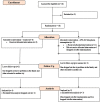Benefits of Gut Microbiota Reconstitution by Beta 1,3-1,6 Glucans in Subjects with Autism Spectrum Disorder and Other Neurodegenerative Diseases
- PMID: 36093695
- PMCID: PMC10473118
- DOI: 10.3233/JAD-220388
Benefits of Gut Microbiota Reconstitution by Beta 1,3-1,6 Glucans in Subjects with Autism Spectrum Disorder and Other Neurodegenerative Diseases
Abstract
Background: Aureobasidium pullulans (black yeast) AFO-202 strain-produced beta glucan, Nichi Glucan, has been shown to improve the behavior and sleep pattern along with an increase in α-synuclein and melatonin in children with autism spectrum disorder (ASD).
Objective: In this randomized pilot clinical study, we have evaluated the gut microbiota of subjects with ASD after consumption of Nichi Glucan.
Methods: Eighteen subjects with ASD were randomly allocated: six subjects in the control group (Group 1): conventional treatment comprising remedial behavioral therapies and L-carnosine 500 mg per day, and 12 subjects (Group 2) underwent supplementation with Nichi Glucan 0.5 g twice daily along with the conventional treatment for 90 days.
Results: Whole genome metagenome (WGM) sequencing of the stool samples at baseline and after intervention showed that among genera of relevance, the abundance of Enterobacteriaceae was decreased almost to zero in Group 2 after intervention, whereas it increased from 0.36% to 0.85% in Group 1. The abundance of Bacteroides increased in Group 1, whereas it decreased in Group 2. The abundance of Prevotella increased while the abundance of Lactobacillus decreased in both Group 1 and Group 2. Among species, a decrease was seen in Escherichia coli, Akkermansia muciniphila CAG:154, Blautia spp., Coprobacillus sp., and Clostridium bolteae CAG:59, with an increase of Faecalibacterium prausnitzii and Prevotella copri, which are both beneficial.
Conclusion: AFO-202 beta 1,3-1,6 glucan, in addition to balancing the gut microbiome in children with ASD and its role in effective control of curli-producing Enterobacteriaceae that leads to α-synuclein misfolding and accumulation, may have a prophylactic role in Parkinson's and Alzheimer's diseases as well.
Keywords: AFO-202; Enterobacteriaceae; autism; beta glucans; curli protein; neurodegenerative diseases.
Conflict of interest statement
Authors’ disclosures available online (
Figures







References
-
- Santocchi E, Guiducci L, Prosperi M, Calderoni S, Gaggini M, Apicella F, Tancredi R, Billeci L, Mastromarino P, Grossi E, Gastaldelli A, Morales MA, Muratori F (2020) Effects of probiotic supplementation on gastrointestinal, sensory and core symptoms in autism spectrum disorders: A randomized controlled trial, Front Psychiatry 11, 550593. - PMC - PubMed
-
- Sampson TR, Challis C, Jain N, Moiseyenko A, Ladinsky MS, Shastri GG, Thron T, Needham BD, Horvath I, Debelius JW, Janssen S, Knight R, Wittung-Stafshede P, Gradinaru V, Chapman M, Mazmanian SK (2020) A gut bacterial amyloid promotes α-synuclein aggregation and motor impairment in mice, eLife 9, e53111. - PMC - PubMed
Publication types
MeSH terms
Substances
LinkOut - more resources
Full Text Sources
Medical
Miscellaneous

